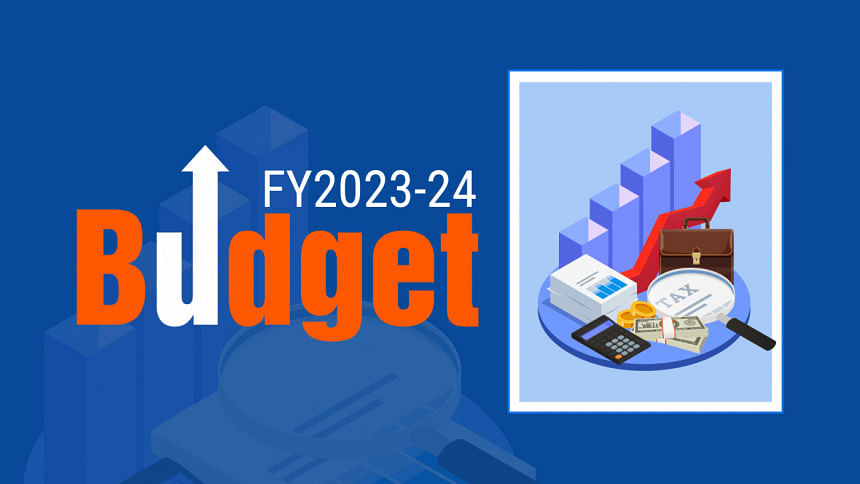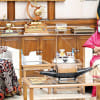A conservative budget for next fiscal year

Prime Minister Sheikh Hasina has called for a conservative budget for the next fiscal year, discounting the impact of the forthcoming national elections on the pre-budget exercise.
The disclosure came during a presentation about the finance division's budget plans to Prime Minister Sheikh Hasina at her official residence Ganabhaban on Wednesday.
The size of next fiscal year's budget would be about Tk 760,000 crore, up 12.1 percent from this fiscal year's original budget and 15.1 percent from the revised budget, The Daily Star has learnt from finance ministry officials informed on the proceedings.
The conditions placed by the International Monetary Fund's $4.7 billion loan programme will inform the budget framework.
At the meeting, Hasina was briefed on the observations made by the IMF staff visit recently.
At the meeting, the prime minister called for prioritising inflation management and economic stability.
"There should be no excess spending because of the election," she said, according to the finance ministry officials.
The message was repeated the following day at the meeting of the National Economic Council, which she chaired.
"There should be no nonessential expenditure by the government," Planning Minister MA Mannan told reporters after the meeting.
In fact, she called for escalating the austerity measures ushered in at the beginning of the fiscal year, he said.
On the first working day of fiscal 2022-23, the government rolled out a cocktail of austerity measures for its own administration.
But earlier in March, the government rolled back most of the austerity measures.
The centrepiece of the austerity stance was the ban on the purchase of vehicles, aircraft, helicopters, ships, boats or barges. That ban was lifted.
In the annual development programme, projects were classified into A, B and C categories. The A-category projects could go on as normal, while up to 75 percent of the allocation for the B-category projects could be spent. All C-category projects were put on hold.
There should be no nonessential expenditure by the government."
Now, the B-category projects can spend up to 85 percent of their allocation, while the C-category projects that are nearing the end can proceed, as per the notification from the finance division.
While the entire revenue budget can now be spent, there are certain guardrails: 75 percent of the allocation for electricity, 50 percent of the allocation for training and 80 percent of the allocation for petrol, oil and lubricant, gas and fuel can be used.
The institutions can spend their allocations on entertainment, travel, training, stationery, electrical equipment and furniture, which they were barred from before. Only for essential and emergency purposes could they spend under these overheads and that too 50 percent of the allotted amount.
Honorariums for attending meetings of the project implementation committee, project steering committee, departmental project evaluation committee and departmental special project evaluation committee -- were resumed too.
Land development as well as the construction of residential and non-residential buildings under the revenue budget, which were on pause for the austerity stance, were resumed.
However, the ban on foreign tours by government officials remains.
And Hasina called for discouraging that well into the new fiscal year too, Mannan said.
"There would be no project or economic activity centring on the elections -- the election is not relevant," he added.
The prime minister also called for shifting the focus away from infrastructure spending and towards social spending.
"She called for more projects on education, health and agriculture," Mannan said.
And taking up projects in these sectors will not be enough; their implementation must be brisk as well.
"Our implementation rate is not good," Mannan said.
In fact, she called for speeding up project implementation and ensuring that there is no duplication in projects, said finance ministry officials.
Projects with foreign aid must be implemented faster, she said, while instructing the finance ministry to take measures to this end.
The prime minister also instructed reining in subsidy expenditure.
Subsidy cannot be extended to new areas; subsidy arrears should be cleared, said finance ministry officials quoting Hasina.
The amount given under safety net programmes will be increased but the coverage will be expanded.
And allocation must be kept such that targeted subsidies can be given in the case of an emergency.
There would be no dearness allowance in the budget, according to finance division officials.
"We did not make any proposal and the PM did not bring it up," said one of the officials on the condition of anonymity.
Meanwhile, at the NEC meeting, it was decided that a Climate Change Trust Fund would be formed. A guideline for that has already been formed.

 For all latest news, follow The Daily Star's Google News channel.
For all latest news, follow The Daily Star's Google News channel. 








Comments